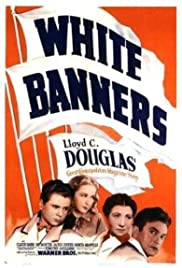
WHITE BANNERS
US, 1938, 93 minutes. Black and white.
Claude Rains, Fay Bainter, Jackie Cooper, Bonita Granville, Henry O’ Neill, Kay Johnson, James Stephenson.
Directed by Edmund Goulding.
White Banners is based on a story by Lloyd C. Douglas. Douglas was a Lutheran minister and a popular author, writer of rather moralistic novels. This can be seen especially in the 1930s version of Magnificent Obsession with the characters offering reflections on deep spirituality, religion, power of positive thinking, even prayer. The central character in this film, played by Fay Bainter, also offers this kind of reflection. For modern audiences, this may be too didactic. Lloyd C. Douglas is probably best known as the author of The Robe which was filmed in 1953, the first Cinemascope film.
This story is set in 1919 in Middle America. Claude Rains portrays a professor at school who is also a would-be inventor. Kay Johnson is his long-suffering wife. Bonita Granville his rather vigorous daughter. Jackie Cooper (so impressive in The Champ, with an Oscar nomination) is the teenage wealthy boy in the town who causes trouble at school but who is seconded by the inventor to help him with his work.
Into their lives comes a woman who helps out in the house, becomes integral to the family, offers words of advice and wisdom. It is fairly evident, early in the film, that she is the mother of the Jackie Cooper character who has been adopted. Part of the dilemma at the end of the film is whether to reveal the truth to the young boy or not.
The film reflects the mores of the early 20th century, the shame for unmarried mothers, the adoption of children, the children not knowing their birth parents.
There is some drama as Claude Rains, with the help of the boy, is able to develop refrigeration without ice. Their patent is stolen by some neighbours – but, with the positive advice, they move on to a further development and success. This is very much the positive way of American thinking and the American dream. The film is done in the Warner Bros style of the 1930s, very effective as drama. Claude Rains is sympathetic, Fay Bainter was nominated for an Oscar for this role but won the same year, 1938, as best supporting actress in Jezebel. Edmund Goulding had made a number of films including Grand Hotel and was to go on to Dark Victory, the Old Maid, The Great Lie and Of Human Bondage and The Razor’s Edge.
1. The impact of the film in the 1930s? The religious philosophy of writers like Lloyd C. Douglas? The positive approach? In retrospect? The impact of this kind of didactic drama now?
2. Production values, the black and white photography, the Middle American town? Homes, streets, school? The musical score?
3. The title, Hannah and her explanation of white banners, knights and chivalry, going ahead positively in life? The motivation for the action in the film?
4. The presentation of the family, coping economically, Paul Ward teaching at school, the pressures on Marcia Ward? Sally and her exuberance? Paul and his teaching Peter Trimble making difficulties with the other boys? Peter Trimble and his wealthy background? Sally keen on Peter? The inventions – and Paul’s absentmindedness?
5. The money difficulties, Hannah and her arrival, trying to sell a peeler, her sitting down, helping Marcia? Cooking the meal? Becoming indispensable? Everybody taking to Hannah well? Her staying? Her work virtually as a servant? The positive approach to each member of the family, helping Marcia with the cooking, getting her to rest? A wise head for Sally? Supportive of Paul?
6. The invention, Peter and his calming down and being able to help Paul? Their work together? The Ellis brothers and their watching the refrigeration, stealing the patent, getting the money? The disappointment for Paul? Peter and his not telling Paul the truth about the Ellises?
7. The connections with Sam Trimble, his connection with Thomas Bradford? The possibilities of investing in the inventions?
8. Paul and his anger, about the Ellises, about Peter? Hannah and her positive thinking, getting him to calm down, to leave the past behind, to go forward? Peter and his enthusiasm for his new invention? Their working together?
9. The emotional crisis, Sam Trimble bringing Thomas Bradford? Hannah revealing the truth about Peter to Paul? Her not wanting to meet Bradford? The encounter, the discussions, the truth about Bradford leaving, Hannah and the adoption of Peter by the Trimbles? Her wanting to be near Peter? The discussions about letting him know or not? The final decision?
10. Paul and the family and success? The Trimbles being happy? Peter and his memories of his mother, Hannah and tucking him in…? Bradford and Hannah leaving him in ignorance?
11. Hannah and her decision to leave, having achieved what she wanted in terms of her son? A story of the 1930s – and how different the situation would be in later decades?